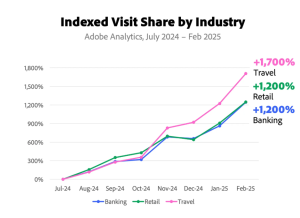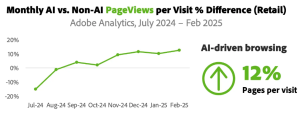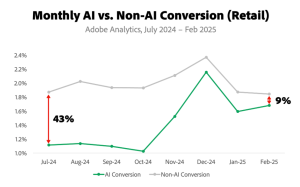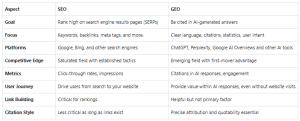Search Disruption

Key Takeaway:
Search is shifting from clicks to conversations. Generative AI is reshaping how people discover, evaluate, and engage with information—blurring the lines between search engines, assistants, and content platforms. Traditional SEO is giving way to Generative Engine Optimization (GEO), as users increasingly expect real-time, citation-backed, conversational answers. To stay visible, brands must optimize for trust, clarity, and AI readability—not just rankings.
Trend Type: Social & Business
Sub-trends: GenAI Search, Search Disruption
From Search to Conversation
Search is no longer just about Google. In 2024, platforms like TikTok, Reddit, and ChatGPT began redefining how people seek information—especially in areas like health and wellness, where AI tools are increasingly used for self-diagnosis. Conversations about AI-powered self-treatment grew by 50% year-over-year (Aug 2023–July 2024), according to WGSN’s Health and Wellness report, reflecting how generative tools are disrupting traditional search behavior.
This shift is also playing out inside legacy platforms. Google and Bing integrated sophisticated AI models to better understand user intent and reduce reliance on keywords. Bain & Company reports that 60% of traditional search queries now end without a click, as features like AI Overviews promote a zero-click ecosystem. ChatGPT’s entry into the search space in 2024 further accelerated this trend, offering real-time, citation-backed responses that feel more like conversations than browsing. Bain found that 80% of users now rely on AI-written summaries for at least 40% of their searches, reducing organic traffic by 15–25%.
Average queries are getting longer—now 10–11 words, up from just 2–3 on traditional engines, according to Perplexity’s CEO. Add to that the rise of voice and image-based queries (projected to reach 50% by 2025, driven by models like Google’s MUM – Multitask Unified Model), and it’s clear: search is becoming multimodal, contextual, and deeply personalized. Reddit is leaning into this shift too, with its 2025 plan to launch Reddit Answers—AI-powered summaries of complex discussions drawn from its massive content corpus.
This convergence is not limited to search engines. According to Forrester’s April 2025 analysis, generative AI is dissolving traditional distinctions between search modalities. AI assistants like Perplexity and Amazon’s Rufus now handle shopping queries through summarization and contextual comparisons. Meanwhile, tools like Adobe’s Acrobat AI and Brave’s Leo facilitate “cognitive search,” summarizing documents and answering queries from PDFs or Google Docs. These varied interfaces are converging toward assistive, agentic experiences—replacing clicks with conversations and speeding up “time to value.”
Already, 37% of consumers use conversational search features whenever possible, according to Forrester’s Market Research Online Community, reflecting a broader shift in behavior. From travel planning with Gemini to task automation through Copilot, users increasingly expect search to feel like a proactive digital assistant.
Retail and Content Disrupted
The retail sector is seeing a marked shift in traffic sources. According to Adobe Analytics, traffic from generative AI sources to U.S. retail websites rose 1,200% between July 2024 and February 2025, with a holiday spike of 1,300% during November–December and a 1,950% surge on Cyber Monday alone. While this traffic still represents a modest share overall, it’s doubling roughly every two months—signaling a rapid shift in discovery behaviors.

Source: Adobe Analytics 2025
In Adobe’s survey of 5,000 U.S. consumers, 39% reported using generative AI for online shopping, and 53% plan to in 2025. These shoppers are using AI to conduct product research (55%), receive recommendations (47%), find deals (43%), and generate shopping lists (33%). Notably, 92% said AI improved their shopping experience, and 87% are more likely to use it for complex purchases.
Generative AI-driven retail sessions also show deeper engagement. Adobe’s data indicates that AI-sourced users view 12% more pages per visit and have a 23% lower bounce rate compared to non-AI sources.

Source: Adobe Analytics 2025
The conversion impact is evolving too. While AI-sourced traffic was initially 43% less likely to convert in July 2024, the gap narrowed to just 9% by February 2025, reflecting increased consumer trust and readiness to buy after engaging with AI tools.

Source: Adobe Analytics 2025
At the same time, generative AI is showing mixed results across industries. While retail, travel (+1,700%), and banking (+1,200%) have seen substantial traffic gains, the media sector remains less impacted. A study by Hagar and Diakopoulos (2024) revealed that generative platforms like ChatGPT and Perplexity currently drive negligible traffic to major news sites—highlighting the limits of AI discovery in some content domains.
Generative Engine Optimization (GEO)
As AI rewrites the rules of how people find information, brands must rethink how they show up in search. The Search Engine Optimization (SEO) playbook—long dominated by keywords and backlinks—is being replaced by Generative Engine Optimization (GEO). Formalized by Princeton researchers, GEO focuses on semantic clarity, source authority, and structure that generative models can easily extract and cite. Techniques like including statistics, quotations, and properly attributed claims can improve visibility in AI-generated answers by up to 40%.

Source: Writesonic 2025
Bain adds that brands must now optimize for AI crawlability, diversify content formats beyond text, and shift performance metrics away from clicks toward impressions and AI mentions. Google’s own evolution—especially with the launch of AI Mode, powered by Gemini 2.0—points to a future of deep research, agentic models, and real-time multimodal interaction. According to Search Engine Land (March 2025), AI Mode represents a significant leap in user experience by enabling conversational refinement of long-tail queries and agent-powered planning flows.
Forrester calls this the rise of holistic search, where generative AI dissolves barriers between search marketing, commerce search, and cognitive search. Previously siloed tasks—like SEO metadata optimization, PPC (Pay Per Click) management, and customer support automation—are beginning to converge into unified strategies. This demands new approaches such as incrementality testing, search engine saturation tracking, and cross-functional collaboration.
As outlined in Forrester’s April 2025 report, search experiences across engines, ecommerce platforms, and enterprise tools are beginning to converge. Examples include Quora’s Poe, Reddit Answers, Workday Assistant, and Salesforce Agentforce—all of which deliver chat-based interactions across domains. This shift is turning search into a distributed, conversational interface across the digital ecosystem.
In this zero-click, AI-curated future, authenticity and trust are critical. Brands that deliver high-quality, culturally fluent, expert-led content—tailored to the user’s real intent—will be the ones AI platforms quote, and consumers believe.
Use Cases
Search Disruption: Rufus is an expert shopping assistant trained on Amazon’s product catalog and information from across the web to answer customer questions on shopping needs, products, and comparisons, make recommendations based on this context, and facilitate product discovery in the same Amazon shopping experience customers use regularly.
GenAI Search: In this video, three different AI interfaces (Google Shopping vs. ChatGPT vs. Perplexity) are used for buying online. They are used to compare – shopping for a 75″ TV, Apple Airpod Pros, and for a Lego.
Use Cases
Sub-Trend Sources
GenAI Search: MIT 10 Breakthrough Technologies, Adobe Analytics
Search Disruption: Brandwatch Digital Marketing Trends, Adobe Analytics
What to Read Next
Scientific AI
AI Meets Scientific Discovery A new frontier is opening where AI is not merely a support tool for scientific research—it’s becoming a catalyst for fundamental breakthroughs. This shift was symbolically[...]
Embodied AI
Embodied AI and Robotics The integration of foundation models into robotics is revolutionizing how machines interact with the world, enabling them to reason, adapt, and operate autonomously in dynamic environments.[...]
Energy Challenge
The Collision of AI and Energy Demand The rise of generative AI is not only transforming digital landscapes—it’s also reshaping the global energy equation. According to Deloitte, the rapid expansion[...]
What to Read Next
Scientific AI
AI Meets Scientific Discovery A new frontier is opening where AI is not merely a support tool for scientific research—it’s becoming a catalyst for fundamental[...]
Embodied AI
Embodied AI and Robotics The integration of foundation models into robotics is revolutionizing how machines interact with the world, enabling them to reason, adapt, and[...]
Energy Challenge
The Collision of AI and Energy Demand The rise of generative AI is not only transforming digital landscapes—it’s also reshaping the global energy equation. According[...]


